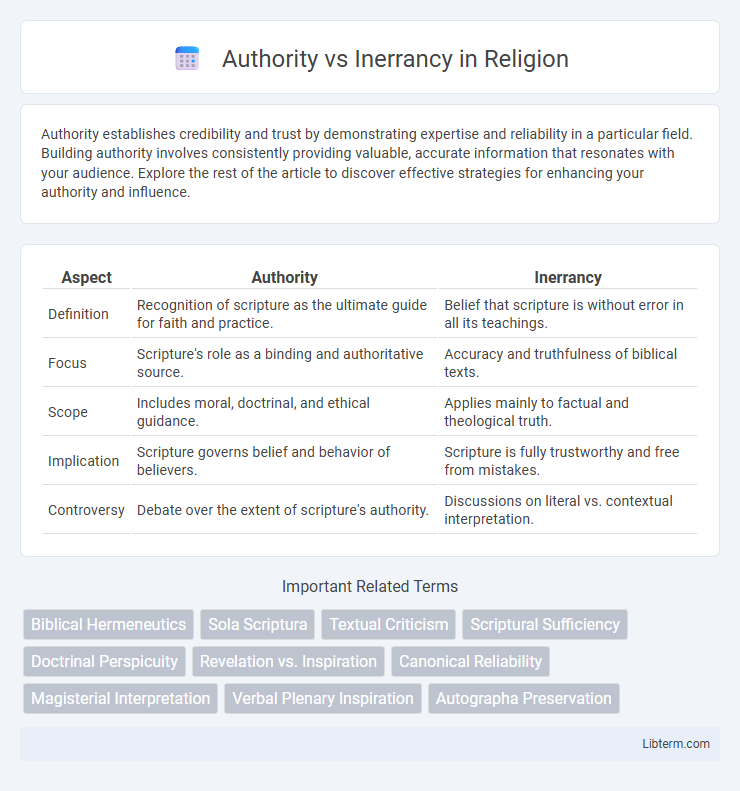Authority establishes credibility and trust by demonstrating expertise and reliability in a particular field. Building authority involves consistently providing valuable, accurate information that resonates with your audience. Explore the rest of the article to discover effective strategies for enhancing your authority and influence.
Table of Comparison
| Aspect | Authority | Inerrancy |
|---|---|---|
| Definition | Recognition of scripture as the ultimate guide for faith and practice. | Belief that scripture is without error in all its teachings. |
| Focus | Scripture's role as a binding and authoritative source. | Accuracy and truthfulness of biblical texts. |
| Scope | Includes moral, doctrinal, and ethical guidance. | Applies mainly to factual and theological truth. |
| Implication | Scripture governs belief and behavior of believers. | Scripture is fully trustworthy and free from mistakes. |
| Controversy | Debate over the extent of scripture's authority. | Discussions on literal vs. contextual interpretation. |
Defining Authority and Inerrancy
Authority in theological contexts refers to the recognized right or power of Scripture or religious teachings to guide belief and practice, often rooted in divine origin and trustworthiness. Inerrancy specifically denotes the belief that Scripture is without error or fault in all its assertions, including historical, factual, and moral statements. Defining authority and inerrancy requires distinguishing authority as the source of influence and inerrancy as the quality of absolute truthfulness and accuracy within that authoritative source.
Historical Development of the Debate
The debate over Authority vs Inerrancy in theological discourse originated during the 19th century with the rise of biblical criticism challenging traditional views of scripture. Early proponents of inerrancy, such as the Princeton theologians, emphasized the Bible's absolute truth and divine authority, rejecting any errors in its texts. Over time, historical-critical methods led to reinterpretations of authority, viewing scripture as authoritative yet accommodating human elements and historical context.
Scriptural Foundations for Authority
Scriptural foundations for authority emphasize the Bible as the ultimate standard for faith and practice, rooted in passages like 2 Timothy 3:16, which affirms all Scripture as God-breathed and profitable for teaching and correction. The doctrine of inerrancy upholds that Scripture, in its original manuscripts, is without error, establishing a reliable foundation for doctrinal authority. This intrinsic divine authority mandates that believers submit to biblical teachings as the final arbiter in matters of truth and conduct.
Scriptural Claims of Inerrancy
Scriptural claims of inerrancy assert that the Bible, in its original manuscripts, is without error in all its teachings and doctrines, serving as the ultimate authority for faith and practice. This doctrine emphasizes the divine inspiration and perfection of Scripture, affirming its reliability and trustworthiness in conveying God's truth. Debates on authority versus inerrancy often hinge on whether interpretive authority resides solely in the biblical text or includes doctrinal traditions and human reasoning.
Key Differences Between Authority and Inerrancy
Authority refers to the recognized right or power to govern beliefs and practices, while inerrancy specifically denotes the absolute freedom from error or fault in a given text or doctrine. The key difference lies in authority being about legitimacy and influence, whereas inerrancy is about the perfection and truthfulness of content. Authority can be acknowledged even if minor errors exist, but inerrancy demands complete accuracy without contradiction.
Authority in Christian Tradition
Authority in Christian tradition refers to the recognized power and trustworthiness of scripture, church teachings, and ecclesiastical leaders in guiding faith and practice. The Bible's authority is foundational, seen as divinely inspired and reliable for doctrine, moral guidance, and spiritual truth. Church authority also includes the magisterium in Catholicism and the collective discernment of early church councils, emphasizing adherence to apostolic teachings and doctrinal consistency.
Challenges to Biblical Inerrancy
Challenges to Biblical inerrancy arise from textual variants, historical discrepancies, and interpretive differences among manuscripts. Skeptics critique the Bible's divine authority by highlighting apparent contradictions and evolving theological perspectives within the scripture. Addressing these issues requires nuanced hermeneutics and an understanding of the Bible's historical and cultural context to uphold its inerrant claims.
Modern Perspectives on Authority vs Inerrancy
Modern perspectives on authority versus inerrancy in theology emphasize the distinction between the Bible's authoritative role in guiding faith and practice and debates over its literal inerrancy. Scholars and theologians increasingly recognize the Bible as a complex, historically situated text that holds spiritual authority without requiring a strict inerrant interpretation. This approach fosters dialogue between traditional doctrinal views and critical scholarship, balancing reverence for Scripture with contemporary understandings of textual nuance.
Implications for Faith and Practice
Authority and inerrancy shape scriptural interpretation by influencing how believers apply biblical teachings to daily life and doctrinal beliefs. Upholding the Bible's authority emphasizes obedience and trust in its guidance, while affirming inerrancy reinforces confidence in the text's absolute truth, affecting decisiveness in moral and theological decisions. Divergence between these concepts can impact faith practice, leading to varied approaches in scripture engagement, worship, and ethical conduct.
Navigating the Tension: Finding Common Ground
Authority and inerrancy often create tension in theological discussions as authority emphasizes the Bible's role as a guiding and binding source, while inerrancy stresses its complete factual accuracy without error. Navigating this tension involves recognizing that both concepts aim to uphold the Bible's trustworthiness but from different perspectives--authority addresses the Bible's role in shaping belief and practice, whereas inerrancy deals with the precision of its content. Finding common ground requires a balanced approach that respects the Bible's spiritual authority while engaging thoughtfully with questions about historical and textual accuracy.
Authority Infographic

 libterm.com
libterm.com